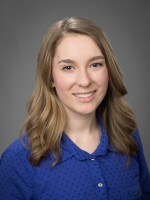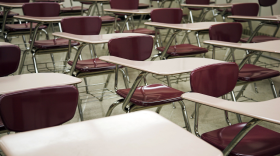With the fall semester underway for public schools across the state, KUNR recently hosted a Facebook Live event in Spanish, with health and education experts, to answer community questions.
Our bilingual reporter Natalie Van Hoozer moderated the Q&A and spoke with Jayden Perez to recap the main takeaways from the discussion.
Jayden Perez: Natalie, KUNR has been reporting in Spanish on the “En Español” section of our website for a few years now, but this was KUNR’s first community engagement event in Spanish, so it’s a milestone. For listeners who weren’t able to attend, fill us in, what was it about?
Natalie Van Hoozer: I moderated a discussion about schools reopening alongside Luis Latino, who runs Latinos de Nevada, a Spanish-language Facebook news page. We had health and education experts as guests for the event.
We talked about a variety of situations related to schools reopening. Clark County is currently doing completely remote learning for its students, and Washoe County is taking a different approach. Many elementary school students are attending classes in person, while middle- and high-schoolers are following a hybrid model, meaning some coursework is in person and some is online.
So far, the event has been viewed over 1,000 times, with some people watching from as far away as Argentina, Paraguay and Colombia.
Perez: One of the expert panelists was nurse practitioner Sonia Rich-Mazzeo of the Alma Clinic in Sparks. What advice did she have for parents who want to ensure their kids are safe as they attend classes in person?
Van Hoozer: Over 90 percent of Sonia Rich-Mazzeo’s patients at the Alma Clinic are Spanish speakers. She is constantly receiving questions from parents, asking if it’s okay for their children to return to the classroom. This is what she had to say:
[Original quote in Spanish]
"Es un riesgo ir a la escuela hoy en día, es increíble pero así es. Es una decisión personal para cada papá, para cada mamá, ver qué va a hacer”.
She said that there is a risk with sending one’s kids to school in person right now, but it’s a personal decision that each family has to make.
For kids attending classes in person, she encourages families to take their kids to school themselves, whether that be driving, biking, or walking, as opposed to having their kids take the bus. She also said that if your child exhibits any COVID-19 symptoms or someone in your family does, that child and everyone else in the family should isolate at home for at least ten days and be symptom-free for at least three days before leaving the house.
She’s also seeing many children fall behind on their vaccinations right now. She encourages families to make sure their children stay current on their vaccines and get their regular flu shot this year.
Perez: What does the situation look like down in Clark County for students and teachers, where schools are only reopening for distance learning?
Van Hoozer: For that update, we had Silvina Jover as a panelist. She’s a bilingual high school social studies teacher in Clark County and she said that remote learning can actually allow for more individualized instruction than in-person classes would.
[Original quote in Spanish]
"Con respecto a lo que es la educación a distancia, es una responsabilidad mucho más grande sobre el estudiante porque es algo un poco más independiente, pero también es una responsabilidad muy grande en los papás y las mamás a todo nivel".
But Jover says that, with remote classes, she’s noticing the additional responsibility put on students and their families for their own education, and that learning gaps will happen if this situation continues.
Nevada also comes in as the state with the third-largest percentage of English learner students in the country, behind California and Texas. As an instructor who teaches English learners, Jover says teachers, schools and families of English learners will have to determine how to prioritize learning course content and learning English. So there are a variety of variables influencing how distance learning works for each student.
Perez: How is school reopening different in Washoe County?
Van Hoozer: For the in-person portion of hybrid learning in Washoe County, KUNR reporter Stephanie Serrano, who was also a panelist, explained that the start of the school year came with many questions for teachers.
She recently interviewed an elementary school special education teacher, who asked to remain anonymous due to fear of retaliation. This educator shared that she wasn’t provided with complete personal protective equipment to be working closely with special education students, who may require diaper changes or other close contact.
[Original quote in Spanish]
"Ahorita están usando bolsas de basura para sus propias batas porque el distrito todavía no les ha dado sus batas propias para la situación".
Serrano said, as a makeshift body cover, this teacher has been using trash bags. Overall, many educators are navigating teaching some of their students online and some in person, as well as regulating social distancing and other protocols among their students.
Dozens of teachers also spoke during public comment at this week’s Washoe County School District Board of Trustees meeting about concerns over things like staffing shortages and some schools not having proper ventilation.
Perez: What are some resources that are available for families right now as they navigate school?
Van Hoozer: Initiatives have cropped up in both Washoe and Clark counties. Different groups are collecting laptops to donate to students. In Northern Nevada, one initiative by and for Spanish speakers is “Mi Motivo” or “My Reason” by Maria Davis, an interpreter and translator in Reno. She’s running this effort and the Facebook group “Be An Angel, Adopt-a-Studnet, Reno, Sparks and Surrounding Areas” as a volunteer, asking for donations and giving away laptops.
In Clark County, our panelist Silvina Jover is involved in a Facebook group “CCSD Padres y Madres” for Spanish-speaking parents. The page offers information and connects families to organizations helping with laptop donations. That page also links to other resources specifically for English learner students. Jover explained that connecting many students with these resources takes volunteers and nonprofits going door-to-door, since it's difficult to reach families with limited phone and internet access any other way.
The whole Q&A panel in Spanish and additional resources are available in the video on KUNR Public Radio’s Facebook page.
KUNR’s Spanish-language Facebook Live event on the reopening of schools was supported by the Mountain West News Bureau, America Amplified, and Noticiero Móvil.







